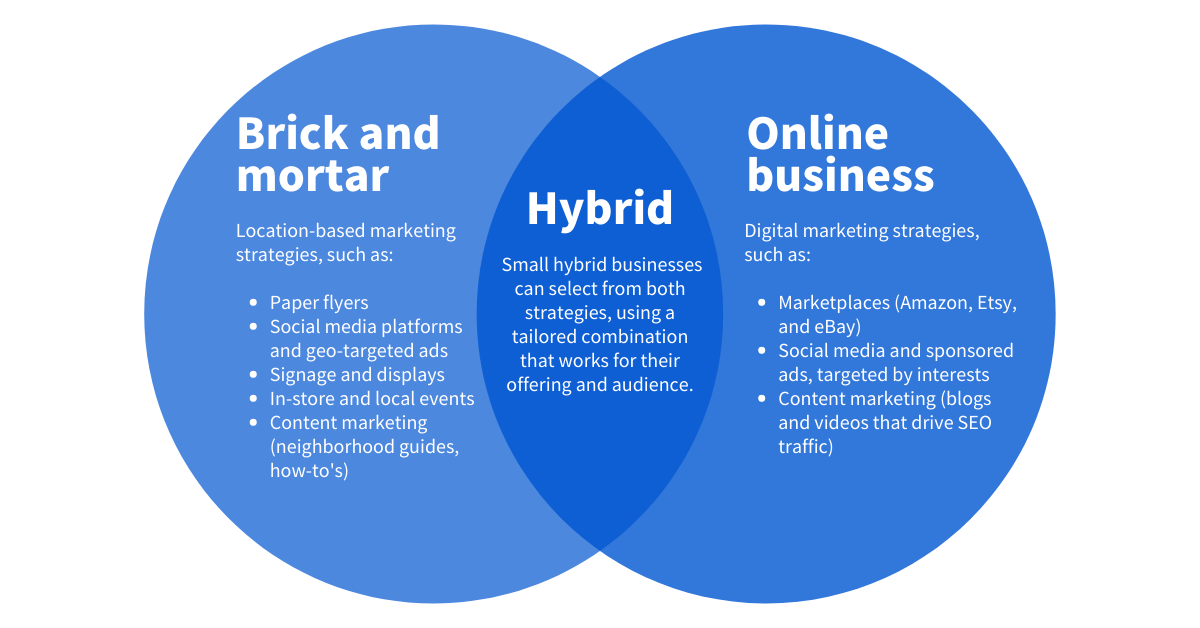Your Guide to Small Business Marketing (+ Real Life Example)
Learn how to market your small business with this step-by-step overview.
![[Featured image] Two women and two men sit at a conference table discussing business marketing.](https://d3njjcbhbojbot.cloudfront.net/api/utilities/v1/imageproxy/https://images.ctfassets.net/wp1lcwdav1p1/6mxaJ3dP3klP3kWDkbEgl6/e61ad2f7d11060bb7c0e9c1c0489d99b/GettyImages-912920596.jpg?w=1500&h=680&q=60&fit=fill&f=faces&fm=jpg&fl=progressive&auto=format%2Ccompress&dpr=1&w=1000)
As a small business owner, the path to success requires connecting your product or service to the right customers. There are a number of marketing channels you can use to reach different audiences, but before you begin messaging, it's worthwhile first to take a few foundational steps.
Marketing should be part of a holistic business strategy that brings greater visibility to your brand and gets people excited about your products or services. Marketing your small business does not need to be complicated to be effective. In this article, we'll go over the steps you can take to set up your business marketing for success.
How to market your small business
When marketing your small business, you should ultimately aim to communicate your value. You'll likely end up doing this in two ways: by communicating the value of your company's product or service, and by communicating the value of your brand.
Both of these kinds of messaging will help you remain competitive over time. However, before you begin communicating anything, it's worthwhile to go through some formative steps to help you define aspects of the larger market in which your company will be situated.
Small business example: Terracotta
Across the steps that follow, we'll use a fictional company called Terracotta, a small ceramics business based in Toronto, to provide more concrete examples. Let's dive in.

1. Begin with the four Ps.
A marketing strategy is a long-term vision that defines the value of your product or service. To understand what your value is, begin by outlining the four Ps, which is a marketing mix that looks at four essential components: product, price, place, and promotion.
Answer the following questions:
Product: What do you sell?
Price: What do you charge?
Place: Where do you sell it?
Promotion: What, if any, messaging have you done to convey its value?
Terracotta’s four Ps
As the owner of Terracotta, you offer a product because you sell handmade pottery bowls in the Greater Los Angeles area. You recently launched, so your customers have been friends, word-of-mouth consumers, and people who found your shop when passing by. You’ve created a brand logo and website, and you've acquired social media handles, but have done no actual promotion.


course
Brand Management: Aligning Business, Brand and Behaviour
Professor Nader Tavassoli of London Business School contrasts traditional approaches to branding - where brands are a visual identity and a promise to ...
4.9
(7,527 ratings)
470,080 already enrolled
Beginner level
Average time: 17 hour(s)
Learn at your own pace
Skills you'll build:
Brand Management
2. Conduct a market analysis.
A market analysis is an opportunity to define your target audience as well as the larger competitive landscape your product will be situated in, among other pieces of information. Both of these primary factors will lead you to develop more specific marketing efforts.
Target market
Your target market will be the groups of potential customers that your goods will most resonate with. You may want to conduct surveys or interviews or use marketing analytics tools to "listen" and understand their unique needs.
Once you have this information, it's a good idea to segment these groups by demographics (age, gender, marital status, education, and income) and psychographics (lifestyle, hobbies, and interests).
After you segment your audience, create personas for each group. These are fictionalized representations of your ideal customers and can help you market to them more specifically by addressing their needs and desires.
Learn more: What is a Niche Market? And How to Reach One
Terracotta’s target audience
Females between 25 and 55 years old who enjoy spending time bonding over an activity, like making pottery or shopping. Salary ranging from $50,000 to $95,000. Lives in Los Angeles or is a tourist. Attended college or university.
Buyer persona 1: Fran is 27 years old and enjoys supporting ethical, sustainable brands. She loves plants and enjoys decorating her studio apartment. Fran has bought several Terracotta bowls and is considering taking up pottery as a hobby.
Buyer persona 2: Callie is a 43-year-old mother of three. She lives in Manhattan Beach with her family and works from home. She does yoga and pilates three times a week. When shopping downtown, she enjoys picking up a few specialty items for herself or friends.

Competitors
After defining who you’re selling to, it's important to do a competitor analysis to differentiate your product or service from other businesses that exist in the market.
You can find competitors by conducting an online search to see what companies sell similar products in your area. Make a list of your five main competitors and spend time looking at their branding and messaging. How do they convey their value? Now, look at your product or service. What are your strengths and weaknesses compared to these other businesses? What makes your product unique? How does your pricing strategy compare?
Whether it is customer service, quality products, location, or price point, identify what makes your business special, and use this to position your brand.
Terracotta’s competitors
With Terracotta, your main competitors in Los Angeles are numerous craft brands that sell handmade ceramic bowls. The differentiating factor is that your bowls and vases have a natural brown-orange color and are sold unglazed. The brand’s ethos relies on these earthy imperfections, so the price point is slightly lower than other craft brands.

3. Devise your business' marketing strategy.
Now it’s time to develop your marketing strategy. The marketing strategy you develop will depend on your unique needs, your marketing budget, and your audience.
There are many types of marketing to choose from, such as traditional (print, advertising); digital (social media, content, email, and SEO); event, influencer, and guerrilla. You will likely work with a few different types of marketing, rather than choose one and pursue it exclusively.
Considering your target audience and your competitors, which channels make the most sense to focus on? For example, if your audience is highly active on social media, then developing a robust presence on Instagram and Facebook might make sense, or if you learn that your audience listens to a lot of local radio, placing a spot with local stations might be a good idea.
Learn more: How to Get Started with Inbound Marketing

specialization
Digital Marketing
Drive Customer Behavior Online. A six-course overview of the latest digital marketing skills, taught by industry experts.
4.6
(16,997 ratings)
354,829 already enrolled
Beginner level
Average time: 4 month(s)
Learn at your own pace
Skills you'll build:
Brand Communication, Social Media, Content Marketing, Digital Marketing, search marketing, Marketing Strategies, Marketing Channel, Mobile Marketing, Integrated Marketing Communications, Data Collection, Data Analysis, Analytics, Data Visualization, Marketing, Marketing Mix, Product Strategies, Pricing Strategies, Marketing Plan, Marketing Performance Measurement And Management, Search Advertising, Marketing Analytics, Marketing Performance
Small business marketing strategies in action
Let’s take a closer look at what strategies might work for brick-and-mortar, online, and hybrid small businesses:
Brick and mortar: Strategies should be location-based for businesses that sell products and services in a physical shop. You might choose from a combination of the following:
Paper flyers at local businesses
Social media platforms (including Facebook, Instagram, Google Maps, and Yelp) for promotions, updates, and ads (targeted by location to reach customers passing by)
Signage and displays
In-store and local events
Content marketing (local neighborhood guides and partnership opportunities)
Online: Online businesses can take advantage of the many types of digital marketing available today to drive traffic and convert it into sales.
Marketplaces such as Amazon, Etsy, and eBay, in addition to your website
Social media and sponsored ads (targeted by interest)
Content marketing (blogs and videos to drive SEO traffic)
Hybrid: Small businesses can select from both strategies, using a tailored combination that works for their offering and audience.

Terracotta’s strategy
As a brick-and-mortar business, you create a strategy for Terracotta that involves a combination of in-person and online marketing:
• Official launch event
• Weekly Instagram posts and daily stories featuring new products
• Paid Instagram advertising (sponsored ads)
• Booth at local craft shows, farmer’s markets, and festivals
• Etsy shop
• Media features from select publications

4. Create a marketing plan.
A marketing plan is how you will go about enacting the marketing strategy you've created, such as hiring a social media intern, working with local contractors to develop blog content, and the timeline for your marketing campaigns.
It helps to figure out which channels you'd like to focus on. Understanding those factors will determine the plan you eventually put in place.
Terracotta’s marketing plan
For Terracotta, you created a Google marketing calendar with different colors for each part of the plan. You hired a full-time intern to help with event planning and digital marketing and help out in the store.
You are in charge of measuring impact and tracking sales. After three months, you compare the percentage of monthly sales to refine the strategy and plan.

5. Review your efforts.
Marketing doesn't end once your messaging is out in the world. It's important to monitor how potential and current customers receive and respond to that messaging, as well as your return on investment (ROI).
ROI explains how the efforts you've made have paid off. If your marketing efforts increase sales, that can be a good indication that you've successfully conveyed your value. However, if you find that's not the case, you will likely need to adjust your marketing strategy and marketing plan.
It's important to use analytical marketing technology (MarTech) to track and monitor how things are going. Data is a big part of marketing now, and different software applications can tell you what's working and what's not so you can adjust your strategy.

professional certificate
Meta Marketing Analytics
Launch Your Career in Marketing Analytics. Build job-ready skills – and must-have AI skills – for an in-demand career. Earn a credential from Meta in 7 months or less. No degree or prior experience required.
4.7
(2,451 ratings)
79,026 already enrolled
Beginner level
Average time: 7 month(s)
Learn at your own pace
Skills you'll build:
Statistics for Marketing, Performance marketing, Data Analysis, Advertising Effectiveness Evaluation, Marketing Mix Optimization, Generative AI in Marketing Analytics, Marketing Plan, Linear Regression, Marketing, Marketing Mix Modeling, Python Programming, Pandas, Data Visualization, Spreadsheet, SQL, Tableau Software, Data Management, Marketing Science, Social Media Marketing, Ads Manager, Facebook Advertising, Statistical Analysis, Statistical Hypothesis Testing, Digital Marketing, Marketing Analytics, Meta advertising, A/B Testing
Learn more about marketing
Build the skills to help market your small business with professional certificates from industry leaders. Learn at your own pace with either Google's Digital Marketing & E-commerce Professional Certificate or Meta's Social Media Marketing Professional Certificate, which both emphasize developing key marketing skills. Get started with a free 7-day trial of Coursera Plus today.

professional certificate
Google Digital Marketing & E-commerce
Get on the fast track to a career in digital marketing. In this certificate program, you’ll learn in-demand skills, and get AI training from Google experts. Learn at your own pace, no degree or experience required.
4.8
(31,551 ratings)
900,625 already enrolled
Beginner level
Average time: 6 month(s)
Learn at your own pace
Skills you'll build:
Search Engine Optimization (SEO), E-Commerce, Email Marketing, display advertising, Marketing, Customer Relationship Management (CRM), Portfolio preparation, Building customer loyalty, E-commerce store optimization, Job preparedness, Social Media Branding, Social Media Analytics, Social Listening, Customer Engagement, Social Media Bidding, Google, Search Engine Marketing, Customer Awareness, Website Structure, Email marketing analytics, Email Writing, Contact management, Email marketing strategy, Email list segmentation, E-Commerce Strategy, Seasonality, E-commerce platforms, Fulfillment and delivery, Customer loyalty, Customer Outreach, Marketing Analytics, Media planning and strategies, Spreadsheet management, Presenting to stakeholders, Digital marketing KPIs

professional certificate
Meta Social Media Marketing
Launch your career as a Social Media Marketer. Build job-ready skills – and must-have AI skills – for an in-demand career. Earn a credential from Meta 5 months or less. No degree or prior experience required.
4.8
(19,200 ratings)
458,966 already enrolled
Beginner level
Average time: 5 month(s)
Learn at your own pace
Skills you'll build:
Social Media Marketing, Generative AI in Social Media Marketing, Brand Management, Content Marketing, Digital Marketing, Performance Advertising, Social Media Marketing Strategy, Marketing, Campaign Management, Ad Management, Meta advertising, Meta Ads Manager, Marketing Content Development, content management, Content Development, Communication, Marketing Strategy, Ads Manager, Marketing Optimization, Digital Analytics
Keep reading

Coursera Staff
Editorial Team
Coursera’s editorial team is comprised of highly experienced professional editors, writers, and fact...
This content has been made available for informational purposes only. Learners are advised to conduct additional research to ensure that courses and other credentials pursued meet their personal, professional, and financial goals.
Whether you're starting your career or trying to advance to the next level, experts at Google are here to help.

Build job-ready skills with access to 10,000+ courses from top universities and companies.
